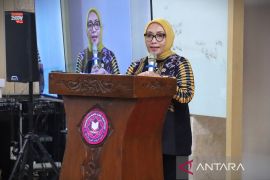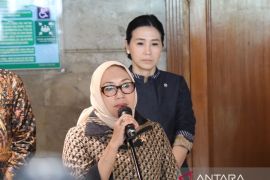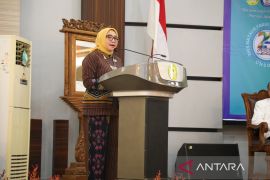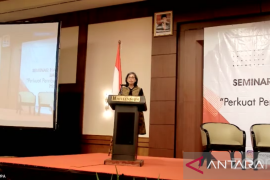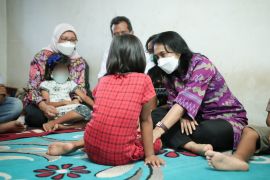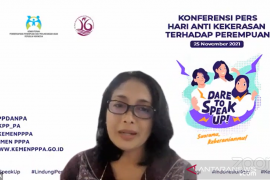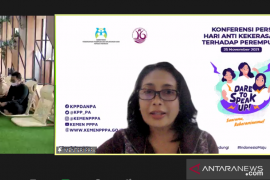Women encounter multiple barriers that discourage reporting violence, including deep-seated fears of reporting, overwhelming shame, and internalized guilt associated with their traumatic experiences.
Difficulties in accessing complaint services, discrimination and re-victimization, and the deep-rooted patriarchal culture pose further obstacles for women.
The commemoration of the 16 Days of Anti-Violence against Women (16 HAKtP) from November 25 to December 10 is a response to the emergency of violence against women in Indonesia.
This year's 16 HAKtP is themed "Protect All, Fulfill Victims' Rights, End Violence against Women."
The Annual Report of the National Commission on Violence against Women (Komnas Perempuan) recorded 289,111 complaints of cases of violence against women in 2023.
Of these cases, 4,347 were reported to Komnas Perempuan, while 3,303 cases were related to gender-based violence.
This means that, on average, Komnas Perempuan receives 16 complaints daily.
The complaint data indicates that gender-based violence (GBV) is predominantly characterized by violence against women in the private sphere, accounting for 284,741 cases, or 98.5 percent.
Meanwhile, 4,182 cases, or 1.4 percent, were reported in the public sphere and 188 cases, or 0.1 percent, in state contexts.
This indicates that the domestic space, which should be a safe place, is, in fact, the main scene of violence.
On the other hand, violence in the public and state spheres reflects a failure to protect women in various spaces.
Officer in Charge for Country Representative UN Women Indonesia Dwi Yuliawati Faiz emphasized that strong law enforcement is the key to preventing and dealing with violence against women.
“We should end impunity so victims can receive justice. This is important to prevent and handle violence against women. When talking about impunity, we should also discuss the importance of strong law enforcement,” she stressed.
To stop impunity, related authorities can encourage and strengthen the implementation of law enforcement.
According to Faiz, Law Number 23 of 2004 concerning the Elimination of Domestic Violence (PKDRT Law) and the enactment of Law Number 12 of 2022 concerning Criminal Acts of Sexual Violence (TPKS) are significant steps taken by the government to stop impunity.
Based on the 2024 Gender Snapshot report conducted by UN Women and UN Desa (United Nations Department of Economic and Social Affairs), countries equipped with legal instruments, including the Domestic Violence Law, reported lower rates of violence against partners, down by 9.5 percent compared to countries that do not have such laws.
Femicide
Femicide is the most extreme gender-based violence against women.
In 2024, several femicide cases were reported in Indonesia, such as wives killed by husbands, women killed by ex-husbands, women killed by their lovers, and sex workers killed by customers.
Femicide is defined as the deliberate murder of women because of their sex or gender.
This act occurs due to superiority, dominance, hegemony, aggression, or misogyny towards women, as well as a sense of ownership of women, unequal power relations, and sadistic satisfaction.
Director of Apik Legal Aid in Semarang, Rara Ayu Hermawati, assessed that law enforcement officers rarely use Law Number 12 of 2022 concerning Criminal Acts of Sexual Violence to handle femicide cases.
Since the enactment of the TPKS law, only a few court decisions related to gender violence have been taken using the Law, including in femicide cases.
This indicates that the state has not provided respect and protection for victims' rights in the legal process.
Indonesian law also does not provide a definition of femicide and the handling of femicide cases.
In addition, cases of murder of women and girls are still handled using the Criminal Code and/or Child Protection Law.
Cross-sector collaboration
The Ministry of Women's Empowerment and Child Protection also promoted the "Dare to Speak Up" campaign among members of the public on December 12 in commemoration of 16 Days of Anti-Violence against Women.
On that occasion, the Ministry of Women's Empowerment and Child Protection, along with ministries and institutions as well as the private sector, announced a joint declaration to create public transportation that is safe, accessible, inclusive, and free from sexual violence.
The joint declaration is a form of commitment to support the acceleration of the implementation of the TPKS Law.
Minister of Women's Empowerment and Child Protection Arifah Fauzi emphasized the importance of cross-sector collaboration to address the problem of violence against women.
"Let us use this momentum as a starting point to strengthen our commitment to protecting and empowering women. With synergy from various parties, protected and empowered women will generate a strong future generation and bring a better future for this country,” the minister remarked.
The campaign to commemorate 16 Days of Anti-Violence against Women aims to invite all parties to synergize to prevent, handle, and eliminate violence against women. Women's protection is a complex issue which requires ongoing cooperation and cross-sector commitment.
Related news: Minister highlights collaboration to tackle violence against women
Related news: Minister calls for support to curb violence against women, children
Related news: Data reference to handle violence against women, children: Ministry
Translator: Anita Permata Dewi, Resinta Sulistiyandari
Editor: Azis Kurmala
Copyright © ANTARA 2024

